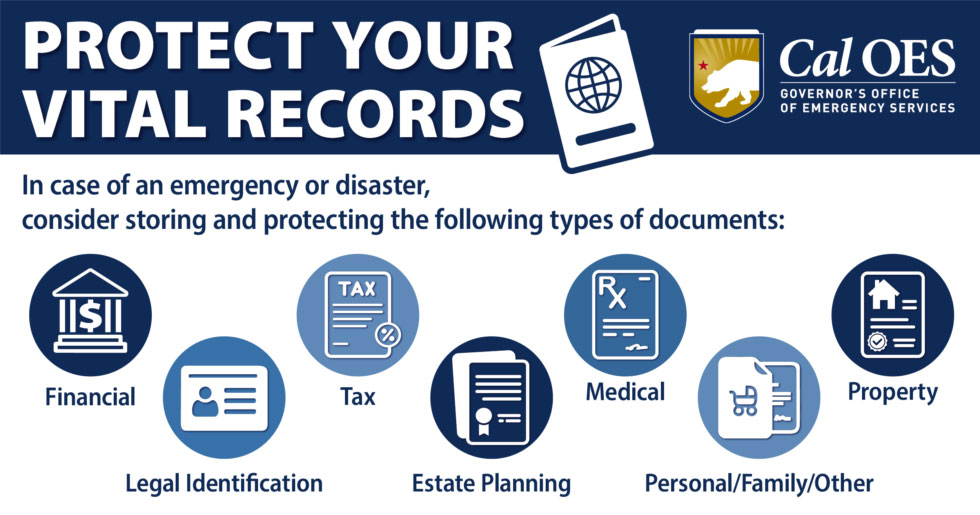
August 9, 2021 - Most disasters happen in the blink of an eye. That’s why it’s important to take appropriate measures before they happen to ensure your family is prepared.
Among other safety steps like setting up alerts, making an evacuation plan and packing a “go” or “stay” bag, it’s also important to carefully store and protect vital documents.
The California Governor’s Office of Emergency Services (Cal OES) has put together helpful tips and resources on storing and protecting important records.
Vital Records:
- Legal identification and vital records
- Driver’s license
- Military ID
- Birth certificates
- Passports
- Citizenship documents (green card, naturalization paperwork, etc.)
- Social Security cards
- Adoption paperwork
- Tax (visit the Internal Revenue Service to determine the appropriate length of time)
- Tax returns
- Receipts, records and other related forms
- W-2s and 1099 forms
- Medical
- Living wills, wills, powers of attorney, burial instructions
- Personal health history, medications
- Personal care plans
- Health insurance policies (coverage, policy number and contact details)
- Medical bills
- Vaccination/immunization records
- Estate Planning
- Wills
- Trusts
- Prenuptial agreements
- Powers of attorney
- Attorney names and phone numbers
- Funeral/burial instructions
- Property
- List of household inventory
- Rental or lease agreements
- Mortgage statements, bills, deeds of sale
- Title company settlement statement
- Insurance policies
- Vehicle, boat or RV registrations and titles
- Financial
- List of each financial account, account numbers and institutions, including account usernames and passwords
- Pay stubs
- Disability or unemployment records
- Retirement/pension plan records
- Investment statements
- Canceled checks
- Legal/Personal/Family/Other
- List of where documents are stored
- Legal documents not covered above
- Usernames and passwords for online accounts
- Valuable or sentimental photos and letters
- Once you’ve identified your vital documents, it’s important to consider several different ways to store and protect them.
Storage Options:
- Physical storage: portable fire resistant/water resistant bag, binder with plastic sleeves, safety deposit box or filing cabinet
- Electronic storage: email, thumb/external hard drive, phone or computer, the cloud
Best Practices:
- Combine physical, thumb/external hard drive and cloud storage
- Don’t keep originals and copies in the same location
- Plan for portable storage in case of a disaster
- Buy a fire and water-resistant bag
- Limit copies of personal documents
While there is a myriad of options to keep your documents secure, please keep in mind the following:
- For security reasons, don’t use cloud storage to keep digital copies of your birth certificate, Social Security card and other identifying information.
- Store thumb/external hard drives separately from document originals.
- Email may be the simplest method of electronic storage, but it isn’t often secure.
- Filing systems act as another layer in document storage but can be bulky and destroyed in a fire or flood.
- If you have a safety deposit box, let someone know. If you trust them, add them as a co-signer. Given the hurdles to use it, don’t store a living will, durable power of attorney or health care proxy, or your original will in a safe deposit box.
Obtaining Replacement Documents After an Emergency
Following major disasters, local, state and federal agencies, as well as non-profit and volunteer organizations, work together to set up a local assistance center (LAC), to help those that have suffered disaster-related losses or damages. In coordination with Cal OES, this assistance often includes replacing vital documents.
State agencies often requested at a LAC include:
- Department of Motor Vehicles
- Franchise Tax Board
- Department of Insurance
- Contractors State Licensing Board
- Housing and Community Development
- Department of Public Health – Vital Document Replacement
Resources:
- Passports: the U.S. State Department
- Birth, death, marriage and divorce records:
- CA Department of Public Health – Vital Records
- County Recorder in the county where the event occurred
- Driver’s license or ID card: The California Department of Motor Vehicles
Source: Cal OES








